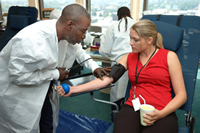|
|
|||||
|
|

The U.S. blood supply is kept as safe as possible from infectious diseases, including malaria, through strict FDA screening guidelines for accepting or deferring donors who have been in malaria-endemic areas. In general, most travelers to an area with malaria are deferred from donating blood for 1 year after their return. Former residents of malaria-risk areas will be deferred for 3 years. Persons diagnosed with malaria cannot donate blood for 3 years after treatment, during which time they must have remained free of symptoms of malaria. Because of these control measures, malaria transmitted via blood transfusion is very rare in the United States and occurs at a rate of less than 1 per 1 million units of blood transfused. CDC assists blood collection centers in keeping the blood supply malaria-free by providing updated information about malaria-risk areas worldwide. Based on CDC malaria-risk information, blood centers can assess the risk of malaria exposure in potential blood donors. Malaria-Risk ResourcesThe resources below are to help blood collection centers to determine malaria-risk areas as accurately as possible. The CDC Travel Medicine Textbook, Health Information for International Travel (the "Yellow Book"), is a biannually published resource for determining areas with malaria-risk. The Malaria-Risk Map is an interactive map that provides location-specific information on current CDC assessments of malaria-risk and recommendations for preventive malaria treatment. (www.cdc.gov/malaria/risk_map) An email subscription service is also available for notification about malaria outbreaks, changes in malaria-risk assessment, and other related information. Subscribe to get email updates. Related sites: * Links to non-Federal organizations found at this site are provided solely as a service to our users. These links do not constitute an endorsement of these organizations or their programs by CDC or the Federal Government, and none should be inferred. CDC is not responsible for the content of the individual organization Web pages found at these links. Page last modified : October 5, 2007 Content source: Division of Parasitic Diseases National Center for Zoonotic, Vector-Borne, and Enteric Diseases (ZVED)
|
|
|||||||||||||||||||||||||||||||||||||||||||||||||||||||||||||||||||||||||
| Home | Policies and Regulations | Disclaimer | e-Government | FOIA | Contact Us | ||||||
|


